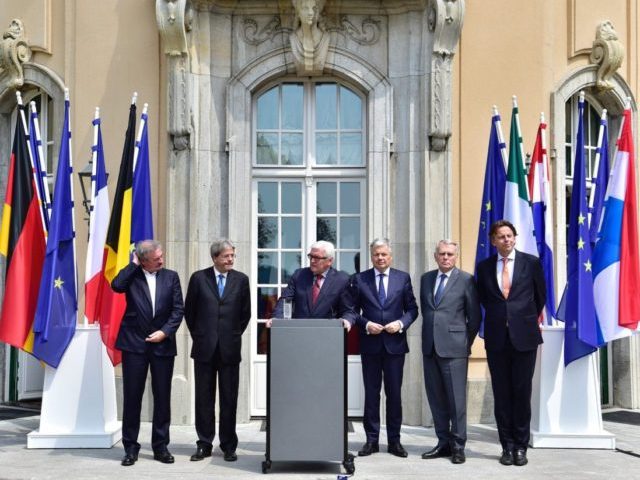As the dust continues to settle following last Thursday’s seismic referendum result, European Leaders are split on how to handle Britain’s exit from the European Union (EU). The victory for Brexit has also led to further calls for EU integration, led by France and Germany.
While the German Chancellor Angela Merkel is holding to a “don’t panic” line, favouring maintaining friendly relations with the UK and allowing British politicians to proceed on their own timetable, others, including Commission President Jean-Claude Juncker want to see the UK punished and made an example of.
The foreign ministers from the EU’s six founding member states – France, Belgium, Germany, Italy, Luxembourg and the Netherlands – met in Berlin for emergency talks on Friday, appearing in front of press together to issue a demand that Britain get the Brexit process underway as quickly as possible.
The German foreign minister, Frank-Walter Steinmeier, said the ministers “join together in saying that this process must begin as soon as possible, so we don’t end up in an extended limbo period”.
And appearing not to understand that a Conservative leadership election would take weeks to conduct, France’s minister Jean-Marc Ayrault said: “A new prime minister must be designated, that will take a few days.” He added that it would “not be respectful” to delay the process, The Guardian reported.
But elsewhere in Berlin there were cooler heads to be found. Ms. Merkel scrapped a scheduled meeting with delegates from the Christian Social Union (CSU), the Bavarian sister party to the chancellor’s Christian Democrats (CDU), in which she had hoped to patch up relations which have become strained during the migrant crisis.
Instead she spent the afternoon insisting that the Brexit result gave no cause for panic. The vote “is a watershed moment for Europe,” she told the Berlin press corp, but she added that its consequences depend on whether the remaining 27 member states “will be willing and able to avoid drawing quick and simple conclusions” from Britain’s exit “that could further divide Europe,” Der Speigel reported.
On Saturday she continued in this magnanimous vein, saying she hopes for a positive climate in the negotiation talks which must now take place between Britain and the rest of the EU.
She insisted there was “no need to be particularly nasty” in the negotiations and that “they must be conducted properly.” And in a rebuttal of Mr. Ayrault’s comments, she added: “To be honest, it shouldn’t take forever, that’s right. But I would not fight over a short period of time.”
It is understood that Ms. Merkel intends to use tomorrow’s summit to urge the outgoing Prime Minister David Cameron to rethink Britain’s decision to invoke Article 50 of the Lisbon Treaty, thereby paving the way for Brexit. Peter Altmaier, the German chancellor’s chief of staff, said Britain should not be pressured into invoking the Article, saying: “Politicians in London should have the opportunity to reconsider the consequences of an exit.”
Yet it remains to be seen whether Ms. Merkel’s cool approach, designed to thwart Brexit, will be the order of the day.
President of the European Parliament Martin Schulz has demanded that Britain open exit talks tomorrow. “Hesitating simply to accommodate the party tactics of the British Conservatives hurts everyone,” he told Bild am Sonntag. “That is why we expect the British government to now deliver. The summit on Tuesday is the right time.”
And Mr. Juncker is pushing for Britain to be taught a lesson with a swift and punishing exit. He has support in the matter from France and Spain, who want populist uprisings agitating for their own departure from the EU to be quelled.
Making it clear that he expects an economic downturn which would force the British Brexit negotiator to take a more conciliatory tone, Mr. Juncker told Bild: “Repercussions of the British referendum could quickly put a stop to crass rabble-rousing, as it should soon become clear that the UK was better off inside the EU — economically, socially and in foreign policy terms.”
Mr. Juncker has his own enemies within the Union however, The Times has revealed; the Czech Republic has demanded his resignation as he “bears responsibility for the people of the UK voting to leave the EU”.
Meanwhile France and Germany are calling for the rest of the EU to respond to Britain’s exit with further integration of the remaining nations. Their foreign ministers have co-authored a paper calling for a “strong Europe in a world of uncertainties” which sets out plans for federalisation of key policy areas, including security and the military.
The ten-page paper, which has been published in full, in English, by Polish news station TVP Info, states: “Our two countries form the basis for an ever closer union of our peoples. We will therefore take further steps towards a political union in Europe and we invite the other European member states to join us in the endeavour.”

COMMENTS
Please let us know if you're having issues with commenting.